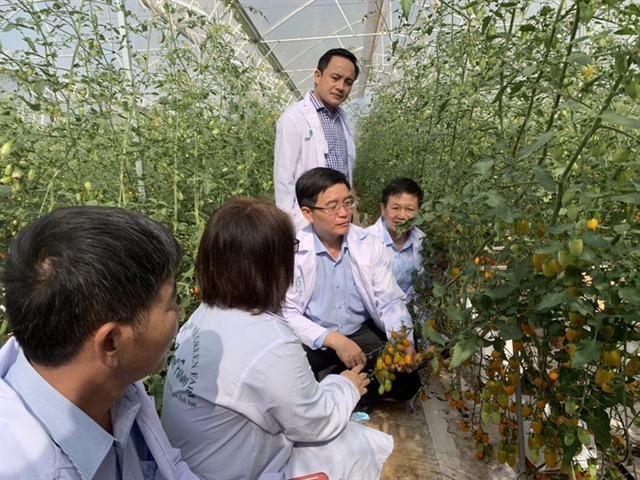 Economy
Economy


|
| Experts visit a high-tech agricultural farm in Đắk Lắk on April 28. — Photo nld.com.vn |
HCM CITY — The Central Highlands province of Đắk Lắk has great potential in agriculture with the country’s largest land area with a fairly flat terrain and a mild climate.
Speaking at the 2022 Đắk Lắk agricultural investment promotion conference late last week (April 28), Phạm Ngọc Nghị, chairman of its People's Committee, said the province has over 300,000 hectares of land with fertile basalt red soil, considered the best for agriculture.
The province’s agricultural sector has made remarkable progress in recent years, he said, pointing out that it grew by more than 1.4 times since 2015 to be worth VNĐ75 trillion (US$3.2 billion) last year.
The province has set up a number of large-scale concentrated production areas, he said.
It is known for its huge rubber and coffee plantations, he noted.
“The Central Highlands have great potential for growing and exporting coffee.”
The Tây Nguyên region, which includes Lâm Đồng, Đắk Nông, Gia Lai, Kon Tum and Đắk Lắk, has 639,000ha of coffee, or 92 per cent of Việt Nam’s total area under the bean.
It has an average yield of 28.5 tonnes per hectare per year.
In Đắk Lắk, the country’s largest coffee producer, 107,000ha out of its total of 210,000ha of coffee have received the ‘Buôn Ma Thuột coffee’ geographical indication, according to its Department of Agriculture and Rural Development.
But it has not fetched significant added value because the exports have not been large.
Representatives of Tây Nguyên provinces at the seminar said they are facing the impacts of climate change, high prices of inputs and lack of infrastructure and workers for coffee cultivation and processing.
Most farms are small and owned by individual farmers, linkages between farmers and companies are weak and the output of individual farmers, farms, co-operatives, and co-operative groups is low.
Deputy Minister of Agriculture and Rural Development Phùng Đức Tiến said there are still many bottlenecks and challenges that Đắk Lắk needs to overcome such as high input prices and low selling prices.
It does not use technology for post-harvest preservation, leading to a high rate of loss, he said.
The management and use of seedlings, fertilisers and pesticides remain inefficient, he said.
Nghi said the province would promote administrative reforms with a focus on reducing the time taken for completing procedures and implementing a ‘one-stop shop’ mechanism, he said.
It would also focus on improving infrastructure and the quality of human resources, and help investors access funding for their projects.
Tiến said the EU is a promising export market for Việt Nam’s coffee yet its exports to the bloc remain insignificant despite the EU – Việt Nam Free Trade Agreement (EVFTA).
“EVFTA offers us a big opportunity. The ministry will develop a project to export agricultural produce to the EU.”
Việt Nam exports coffee to more than 80 countries and territories, accounting for 20-22 per cent of global exports.
The province should work with the Ministry of Foreign Affairs and other agencies to receive up-to-date information on its partners and optimise investment promotion, experts said.
Đắk Lắk should also organise regular meetings with large domestic and foreign companies to apprise them about its potential, they added. — VNS